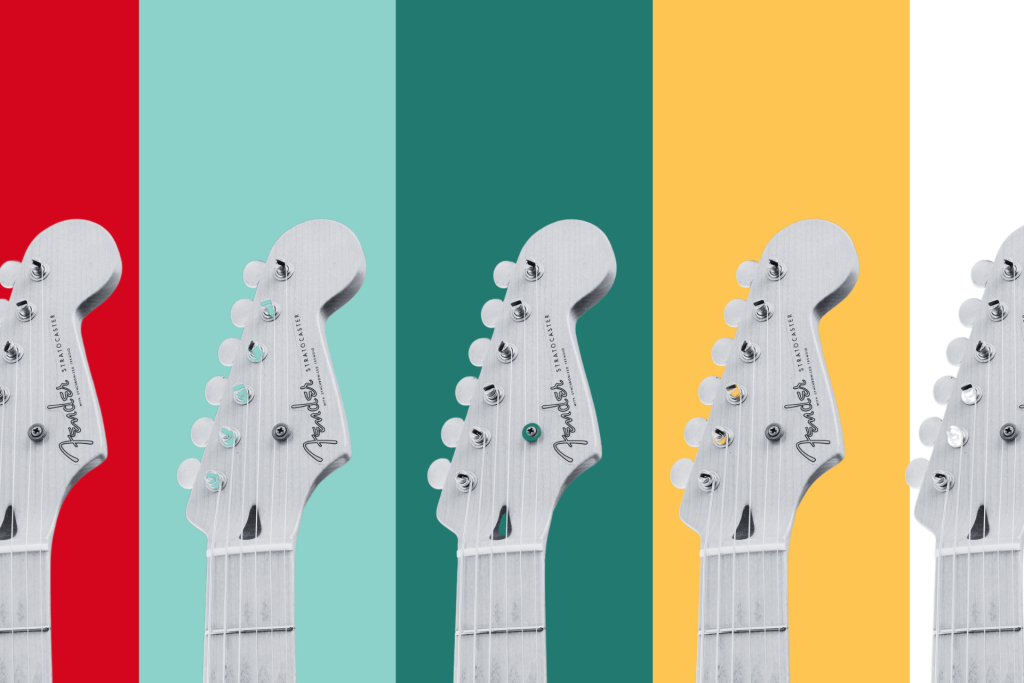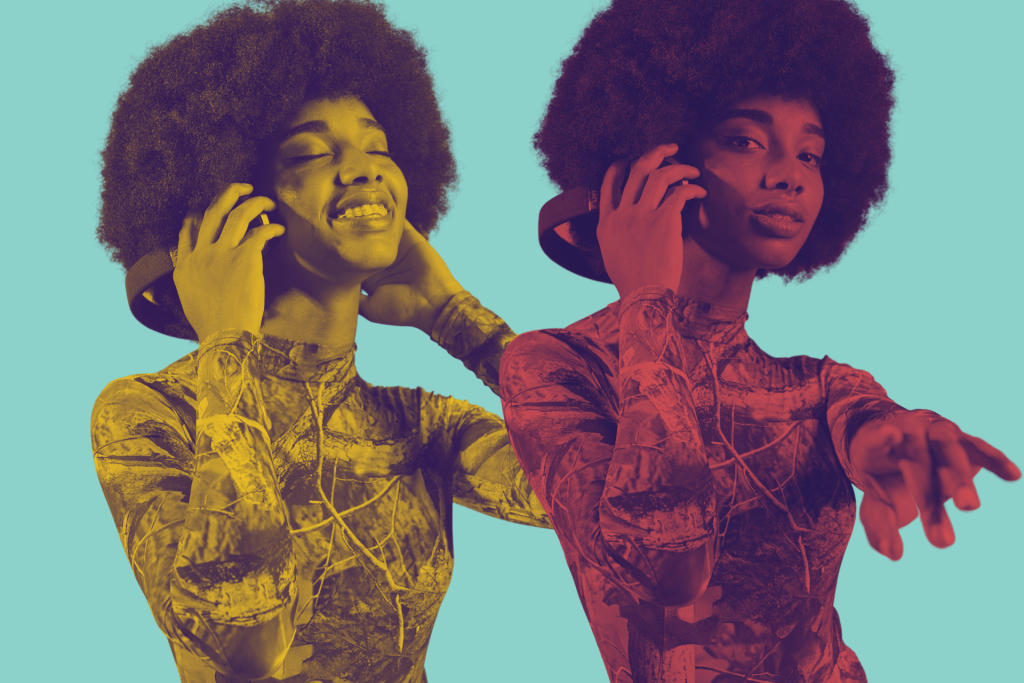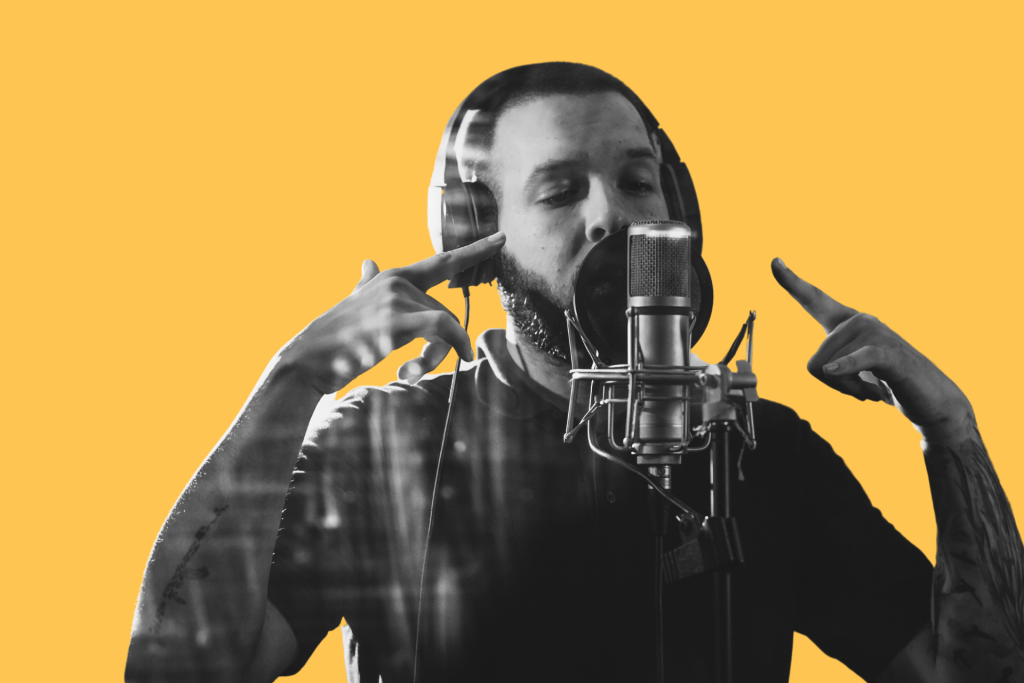Ready to turn your musical passion into a record deal reality? Time to swap those bedroom jam sessions for the big stage? Whether you’re a hip-hop artist or a garage band ready to rock the world, getting signed to a record label is easier than it seems.
We created this guide to be about as straightforward as they come. No smoke and mirrors here—just a roadmap of savvy steps to charm record labels and prove you’re the real deal.
Here’s the nitty-gritty of How To Get Signed To A Record Label.
Mic check, one-two, let’s roll!
What Are The Different Types Of Record Labels?
Just like matching the right chord progression, you need to harmonize with your potential label. You’ve got two main players in the ring when it comes to record labels: the indie label and the major label. Finding the right label involves researching and identifying record companies that align with your music style and goals.
Major record labels
When it comes to the music industry’s power players, major record labels strut onto the stage with undeniable gusto. And when you first start pondering how to get signed to a record label, you may think major labels are the way to go. These are some of the big names you’ve likely heard tossed around:
Universal Music Group
Headquartered in Hilversum, Netherlands, stands as a titan in the music industry with a reported revenue of $11.3 billion in 2022. Boasting an impressive roster, the label is home to legendary acts such as The Beatles, Queen, Coldplay, and contemporary icons like Drake and Kanye West.
Sony Music Entertainment
Headquartered in New York, NY, solidifies its prominent position in the music industry with a reported revenue of $10.35 billion in 2023. The label has an impressive array of iconic artists, ranging from the legendary Wu-Tang Clan and the incomparable Michael Jackson to modern luminaries like John Legend and Beyoncé.
Warner Music Group
Based in New York, NY, Warner Music Group maintains its substantial footprint in the music realm, recording a revenue of $5.948 billion in 2023. The label showcases an array of notable artists encompassing various genres, from the legendary Red Hot Chili Peppers and the enduring Cher, to contemporary stars like Ed Sheeran and Dua Lipa.
Take one look at the annual revenue these labels bring in, and you’ll see they pack a serious punch in terms of resources. But a common misconception is that getting signed to a major label deal is the ultimate goal.
There’s a flip side to the glitz and glam. Major labels often boast an extensive roster of artists. With so many mouths to feed, it’s easy to feel like you’re just one note lost in the grand symphony of things.
Plus, signing the dotted line isn’t a guaranteed ticket to stardom, and it’s not a choice to be made lightly. Sure, major labels can offer immense exposure, but remember, it’s not all rock ‘n’ roll parties and red carpets. There will be extreme demands on your time, creative sacrifices, and outrageous pressure to deliver…or else.
 Indie record labels
Indie record labels
As you’re researching how to get signed to a record label, don’t underestimate their role in the music industry. Independent labels might not always make headlines, but they’re the unsung heroes signing 43.1% of the acts in music. They’re not just a footnote; they’re a significant chapter in the music industry’s book, carving out spaces for unconventional sounds and underrepresented voices.
Artists like Adele, Thundercat, Arctic Monkeys, and Chance the Rapper launched their music careers under the guidance of indie record deals before they became household names. These labels provide an environment where artists can experiment, take risks, and be more than just another cog in the machine.
Indie labels offer a sanctuary for the creatively audacious. Indie labels aren’t just labels; they’re partners in your artistic journey, helping you create music that resonates with souls, not just speakers. So, if you’re looking for a home where your sound can flourish organically, the indie label scene might just be the stage you’re destined for.
How To Get Signed To A Record Label In 3 Steps
We’re all about keeping things simple, so here’s a quick breakdown of how to get signed.
1. Nail down your unique musical identity.
Your originality isn’t just a badge of artistic integrity; it’s also a beacon that attracts the attention of record label scouts searching for the next big thing. So the first step in how to get signed to a record label is to fully flesh out who you are as an artist.
Some of the most successful artists in history owe their fame to their distinctive musical styles. Consider the unparalleled innovation of David Bowie, who continually reinvented himself and his sound. Or take the captivating enigma of Björk, whose experimental blend of electronic and avant-garde elements defies categorization. These artists didn’t just follow trends – they created them.
When listeners can instantly recognize your sound in a sea of options, you’re not just an artist; you’re a brand with a loyal following.
- Experiment with a few different genres before settling in. Crafting your original musical identity often involves experimenting with different genres and styles.
- Don’t be afraid to cross boundaries and combine elements that might not naturally fit together. Some of the most groundbreaking innovations in music have emerged from unexpected fusions of genres.
- Aim for authenticity over imitation. While inspiration from your favorite artists is natural, avoid simply mimicking their style. Authenticity is what sets you apart.
- Infuse your personal experiences, emotions, and perspectives into your style of music. Your unique life story and the way you interpret the world around you can become a wellspring of originality.
- Collaborate and absorb. Interacting with other musicians and artists can be a wellspring of creative energy. Collaborations expose you to different perspectives and musical styles, helping you evolve and refine your own. Attend jam sessions, workshops, and music festivals to immerse yourself in diverse sounds.
 2. Build a presence in your community.
2. Build a presence in your community.
Aspiring artists no longer rely solely on record labels to build their fan base – they have the power to cultivate their own following. And most labels will appreciate artists with a bit of an organic following. That’s why step two in how to get signed to a record label is to build your own community around your music.
Leverage your social media profiles.
Social media platforms like Instagram, Twitter, Facebook, TikTok, and more enable musicians to share their journey, engage in conversations, and showcase their unique personalities beyond their music.
The impact of a strong social media presence cannot be overstated – it’s a way to create a virtual hub for your fans, where they can stay updated on your latest releases, collaborations, and upcoming shows.
- Regular updates keep your audience engaged. Whether it’s sharing snippets of your creative process, behind-the-scenes moments, or personal insights, maintaining a consistent posting schedule helps keep your followers invested.
- Social media is a window into your world as an artist. Share your genuine thoughts and emotions, and let your personality shine. Authenticity resonates with fans and distinguishes you from the countless generic accounts out there.
- Respond to comments, messages, and interactions from your followers. Building a rapport with your fans creates a sense of connection that transcends the digital divide.
Take advantage of open mic nights.
Open mic nights are often the grassroots breeding grounds for emerging talent. These intimate events provide a platform for you to showcase your music to a live audience and gain valuable experience in front of crowds. They also offer an opportunity to connect with fellow musicians and even collaborate on future projects.
Book a few shows.
While digital platforms provide far-reaching exposure, there’s no substitute for the energy and connection that comes from performing live. Start by booking shows at local venues or events in your local music scene.
As you gain more experience performing together, your chemistry and stage presence will improve, which is something record labels take into consideration. The more you demonstrate your ability to captivate an audience, the more compelling your case becomes to potential label partners.
 3. Submit your demo.
3. Submit your demo.
Bad news: the dream of being discovered by a major record producer after a few shows is wishful thinking. The reality is that success often requires initiative, resilience, and putting yourself out there through submissions.
More bad news: most major record labels don’t accept unsolicited demos.
Good news: lots of indie labels want your submissions. So the final step in how to get signed to a record label is to make a list of record labels accepting submissions and get to work submitting your demo.
Just be mentally prepared before you begin—your journey to getting signed to a record label will undoubtedly involve rejections. And while you might face numerous “no” responses, all you need is one resounding “yes” to propel your career forward.
- Actively seek out labels that align with your musical style and ethos. Explore the genres they focus on and explore their website and socials. Learn what you can about their profit-sharing system and onboarding process. Make a list of questions if you can’t immediately find the answers you’re looking for so you have them on hand in case you manage to land a conversation.
- Get high-quality files together for submission. When you’ve identified potential labels, it’s time to assemble a submission package that stands out. Your demos could exist as audio files on your computer or as music videos on YouTube—just make sure they sound good.
- Write a compelling artist biography. Your artist biography is your chance to convey your story, influences, and aspirations in a succinct yet engaging manner. Highlight key moments of your musical journey, experiences that have shaped you, and what makes you unique.
- Selecting the right tracks for submission is crucial. Choose songs that represent your musical identity and display a range of your skills and creativity. It’s not about quantity, but quality.
- If the record label likes your submission, they’ll be in touch. You’ll likely have a meeting with a few of the bigwigs in charge to talk shop. Then, the label will almost certainly ask to see you perform, so be prepared for visitors at your next rehearsal. After that, if they like your work, you’ll be looking at a contract.
Avoid These 6 Common New Artist Mistakes
When you’re the new kid on the block, it’s easy to stumble upon pitfalls that could hinder your progress. So we also want to hit you with some common mistakes to avoid as you research how to get signed to a record label. Here are some common blunders to steer clear of when making submitting new music to a record label.
1. Sending unfinished work
Submitting rough drafts or incomplete tracks can leave a negative impression. Labels are looking for polished, well-crafted music that showcases your potential. Take the time to refine your tracks before sending them out.
2. Failing to research the label
Every label has a distinct vibe, genre preferences, and signing history. Failing to research the label you’re submitting to can lead to mismatched expectations. Tailor your submission to fit the label’s style and showcase how your music aligns with their vision.
3. Neglecting professional presentation
Your submission is not just about the music; it’s about the entire package. Poorly organized files, unclear contact information, or a lack of context in your submission can detract from your music’s impact. Present your submission with professionalism, making it easy for the label to understand who you are and what you’re offering.
4. Overloading your submission
Less is often more when it comes to submitting music. Sending an overwhelming number of tracks can dilute the impact of your best work. Instead, choose a selection of your strongest tracks that best represent your style and potential.
5. Disregarding feedback
Rejection is a part of the music industry, and you might receive feedback along the way. Disregarding or becoming defensive about feedback can hinder your growth. Instead, view feedback as a valuable opportunity to learn and improve your music.
6. Lacking patience
Getting signed to a label takes time. Contrary to what you see in movies, breaking into the music business doesn’t happen overnight. Impatience can lead to hastily made decisions or the temptation to settle for less than you deserve. Stay committed to your craft, and focus on continuously improving your skills and building your audience.
There Are SO MANY Benefits To Getting Signed To A Record Label
From crafting your sound to conquering the charts, being signed to a record label comes with a treasure trove of perks.
Access to resources
Ever dreamed of recording your music in a state-of-the-art studio with sound engineers who speak the language of melodies? Record labels make it happen. They’ve got the keys to studios, equipment, and professionals that can elevate your sonic journey.
Spotlight on your sound
They’re the puppet masters of publicity campaigns, ensuring your music reaches every corner of the world. They’re the architects behind packed concerts, sensational tours, and a distribution network that stretches far beyond your hometown.
Legal guardians of your artistic kingdom
The legal nitty-gritty of the music world can be more intricate than a labyrinth. But with a record label by your side, they’ll ensure your artistic rights are respected and protect you from pitfalls.
Monetizing your melodies
You’re not just creating music; you’re also creating a livelihood. Labels are your financial sherpa, guiding you through royalties, streaming revenue, and other income streams you might not even know exist. They’re invested in your success because when you thrive, so do they.
Hardstop Records Wants Your Music Submission
Yes, you – the unsigned artist who dares to stand out, is ready to make waves, and is prepared to start a music career. Whether you’re a solo independent artist with a guitar in hand, a band pushing genre boundaries, or a creator defying labels, we’re here to give your talent the spotlight it deserves in the music business.
The world is waiting to hear what you’ve got to offer, and Hardstop Records is the independent label that wants to amplify your voice.
Submit your demo today, and you could be a professional artist with a contract in hand tomorrow. Or the next day—whenever we’re both free for coffee.



 Indie record labels
Indie record labels 2. Build a presence in your community.
2. Build a presence in your community.
